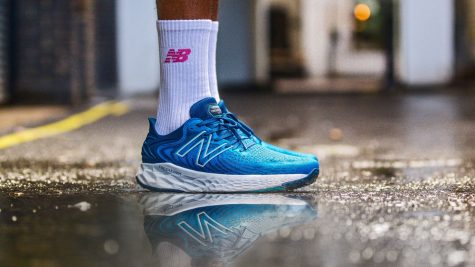Running: A Battle of Wills

Runner on pavement.
January 24, 2022
Running is a difficult sport. It is easily one of the most physically and mentally demanding sports. While it may not have the concussive forces of other sports like football, the constant and repetitive pounding on one’s legs has a high chance of damaging a part of the leg. Running also requires strong mental strength, as runners must be able to push through the physical pain and keep their strong mindset through their entire race. The great divide that separates good runners from great runners is how well they can push the pain out of their minds and keep going, even when their body may be screaming at them to stop. While there is not a surefire way to totally rule out injury or to strengthen mental fortitude, many runners have different ways of giving themselves a leg up over the competition, most of which can be used by anyone from a hobby jogger all the way up to an Olympic-level runner.

One of the most important things for running, or any sport for that matter, is to eat and drink well before a run or workout. Eating and drinking well before a run will help a runner to have fresh energy, strength, and endurance. It will also most likely improve a runner’s mood. Drinking is important too, as if a runner is dehydrated, they may suffer from a dry mouth, cramps, weakness, and migraines. Dehydration can even become dangerous if a runner is too dehydrated. Before a run, a runner should try to eat about an hour in advance and should eat something that is healthy but light. Some of the best light foods are fruits and vegetables, as well as most foods that are not high in protein or fiber. Eating something heavy, like a protein bar, will not digest fast enough and could cause an upset stomach. After running, try to eat as soon as possible and eat something that is high in protein. Eating soon after a workout gives muscles the fuel and materials that they need to rebuild themselves. Also make sure to rehydrate well, as running at any temperature will likely cause sweating and some extent of dehydration. The importance of fueling well before running is shown in a poll given to Brentsville District High School’s track distance runners, in which 100% of them agreed that fueling well before running helped them to run better.
Some describe running as being a 50/50 split between mental and physical strength. In the same poll as mentioned before, distance runners fully agreed that mental strength is just as important as physical strength for runners. While different things will work for different people, there are some things that a runner can do to help improve their mental strength and their attitude towards running. First, try to set reasonable goals. Once baseline times are set, try to work down towards a reasonable goal. Even if progress is little by little, reasonable goals are likely to be met as long as the runner keeps working hard. Setting unreasonable goals can have an adverse effect on mentality, as not achieving a goal may lead to a runner becoming unmotivated as they are not achieving their goals. Many runners also find that not being too serious about running helps them to perform better as they are not nervous about their performances. Finally, meditation may help a runner to improve their mental toughness and to gain a better mindset about running.

Injuries are a major roadblock in many runners’ careers. Pete Magill of Podium Runner states that runners get injured not because of their bodies or their genes, but because they “train like an idiot.” Pete and many other professional and hardcore runners agree that some injuries may be caused by genetic factors, but that most are caused by incorrect training or not doing things to take care and strengthen their legs beyond just running, like not stretching or not foam rolling their legs. In the poll mentioned above, all respondents said they suffered from some form of injury from running at some point. Inexperienced runners should get advice from more experienced runners on training. Runners should also invest in shoes that are suited for what kind of running they will be doing and that supports their arch level. While it may be enticing to go for a cheaper pair of shoes, runners should not skimp on quality due to price. Runners should also always statically stretch after any run. Runners should also always listen to their bodies and not push through pain to keep running, as pain is usually a sign that something is wrong. While every runner will be sore at some point, there is a difference between normal soreness and pain, which could be the indicator of something worse. Runners should always make sure to do a good warm up before running, and to cool down after hard runs. While injuries can never be totally ruled out, doing these things can help mitigate the risk of injury.

While running can be mentally and physically taxing and can cause injury, following these tips can help a runner to succeed. If a runner has a question about running, there are plenty of trustworthy resources online that post information on running. Runners also should not be afraid of asking other runners for help, as many are willing to help more inexperienced runners and teach them the ropes when it comes to running. While it is normal to get discouraged from running for one reason or another, with perseverance, anyone can become a great runner.
Source:
Magill, Pete. “Ask Pete: Why Do I Keep Getting Injured?” Podium Runner, 22 Sept. 2020, https://www.podiumrunner.com/training/why-do-i-get-injured-ask-pete/.
